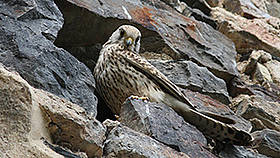Internationale Studie zeigt die globalen Wirkungen der Städte für die biologische Vielfalt von Vögeln und Pflanzen auf
Die Ergebnisse einer weltweiten Auswertung von Artenlisten für Vögel und Pflanzen in Städten durch eine internationale Forschergruppe zeigen, welchen Einfluss und welche Bedeutung Städte für die globale Biodiversität haben. In dieser international besetzten Forschergruppe hat auch Peter Werner vom IWU mitgearbeitet. Die Forschergruppe fasst ihre Ergebnisse folgendermaßen zusammen:
“Cities are often thought of as concrete jungles, not capable of supporting biodiversity. In this study, we examined the birds in 54 cities and plants in 110 cities worldwide. We found that cities support surprisingly high numbers of plant and bird species. However, cities have also lost significant biodiversity with urbanization. The most common species worldwide are pigeons and annual meadow grass. As urbanization continues to expand, conservation of blocks of intact vegetation within cities could enhance biodiversity. Despite declines in species, cities still retain endemic native species, providing opportunities for regional and global biodiversity conservation, restoration, and education.”
Die Ergebnisse der Studie sind unter dem Titel “A global analysis of the impacts of urbanization on bird and plant diversity reveals key anthropogenic drivers” am 12. Februar 2014 in den Proceedings of the Royal Society, Biological Sciences, London veröffentlicht und der Presse vorgestellt worden.
Im Folgenden einige Reaktionen der Internationalen Medien auf die oben genannte Veröffentlichung:
- www.bbc.co.uk/news/science-environment-26140827
- strangebehaviors.wordpress.com/2014/02/12/how-do-plants-and-ani
- blog.education.nationalgeographic.com/2014/02/12/study-records-biodiversity-in-cities/
- www.sciencedaily.com/releases/2014/02/140212132950.htm
- unbconnect.com/study-shows-urbanisations-impact-on-biodiversity/#&panel1-3
- njenvironmentnews.com/2014/02/12/study-shows-urbanisations-impact-biodiversity/
- naturlink.sapo.pt/Noticias/Noticias/content/A-biodiversidade-urbana-nao-e-afinal-semelhante-em-todo-o-mundo?bl=1
- www.stop.hu/tudomany/ezert-kell-megorizni-a-varosi-zoldteruleteket/1216160/
- www.pikiran-rakyat.com/node/269766
- blueandgreentomorrow.com/2014/02/12/green-spaces-in-cities-could-restore-species-lost-to-urbanisation/
- www.natureworldnews.com/articles/6002/20140212/urban-green-space-enables-unexpected-biodiversity.htm
- www.sunderlandnow.com/science-and-environment/study-shows-urbanisations-impact-biodiversity/
- esciencenews.com/articles/2014/02/12/cities.support.more.native.biodiversity.previously.thought
- www.alwaysresearching.com/
- cafnrnews.com/2014/02/bird-in-the-city/
